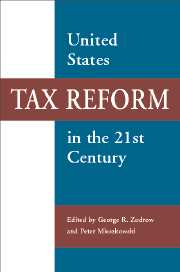Book contents
- Frontmatter
- Contents
- List of Contributors
- Preface
- 1 Introduction: The Fundamental Question in Fundamental Tax Reform
- 2 Behavioral Responses to a Consumption Tax
- 3 The Economic Impact of Fundamental Tax Reform
- 4 Capital Income Taxation in Tax Reform: Implications for Analysis of Distribution and Efficiency
- 5 International Aspects of Fundamental Tax Reform
- 6 Distributive Analysis of Fundamental Tax Reform
- 7 The Role of Administrative Issues in Tax Reform: Simplicity, Compliance, and Administration
- 8 Evaluating the National Retail Sales Tax from a VAT Perspective
- 9 Transitional Issues in the Implementation of a Flat Tax or a National Retail Sales Tax
- 10 Historical and Contemporary Debate on Consumption Taxes
- 11 The Politics and Ideology of Fundamental Tax Reform
- Bibliography
- Index
4 - Capital Income Taxation in Tax Reform: Implications for Analysis of Distribution and Efficiency
Published online by Cambridge University Press: 23 October 2009
- Frontmatter
- Contents
- List of Contributors
- Preface
- 1 Introduction: The Fundamental Question in Fundamental Tax Reform
- 2 Behavioral Responses to a Consumption Tax
- 3 The Economic Impact of Fundamental Tax Reform
- 4 Capital Income Taxation in Tax Reform: Implications for Analysis of Distribution and Efficiency
- 5 International Aspects of Fundamental Tax Reform
- 6 Distributive Analysis of Fundamental Tax Reform
- 7 The Role of Administrative Issues in Tax Reform: Simplicity, Compliance, and Administration
- 8 Evaluating the National Retail Sales Tax from a VAT Perspective
- 9 Transitional Issues in the Implementation of a Flat Tax or a National Retail Sales Tax
- 10 Historical and Contemporary Debate on Consumption Taxes
- 11 The Politics and Ideology of Fundamental Tax Reform
- Bibliography
- Index
Summary
Many recent proposals for fundamental tax reform have advocated replacing the current tax system with a broad-based consumption tax. Economists' support for such proposals centers on the gains in economic well-being made possible by tax reform. Three sources of efficiency gains would, in principle, accompany a switch to consumption taxation. First, the removal of the current tax on returns to new saving would eliminate distortions of savings decisions, augment capital accumulation, and, eventually, per capita consumption. Second, a pure consumption tax would remove distortions in the allocation of capital across sectors and types of capital. Third, a broad-based consumption tax would avoid potentially costly distortions of firms' financial structures. Recent estimates suggest that the efficiency gains from consumption tax reform could be quite substantial (see, e.g., Auerbach, 1996; Jorgenson, 1996c; Jorgenson and Wilcoxen, Chapter 3 in this volume; and Gravelle, Chapter 2 in this volume).
Another group of proposals has suggested reforming capital taxation under the income tax, in particular toward taxing broad measures of income once (see, e.g., American Law Institute, 1993; and U.S. Department of the Treasury, 1992). Although the debate between these “income tax reforms” and “consumption tax reforms” often characterizes the differences between the two options for reform as significant, I argue that for distributional analysis, and possibly for efficiency analysis, the distinction between reform toward a broad-based income tax and reform toward a broad-based consumption tax is not as large as that suggested by models conventionally used to analyze tax reform.
- Type
- Chapter
- Information
- United States Tax Reform in the 21st Century , pp. 89 - 108Publisher: Cambridge University PressPrint publication year: 2002



